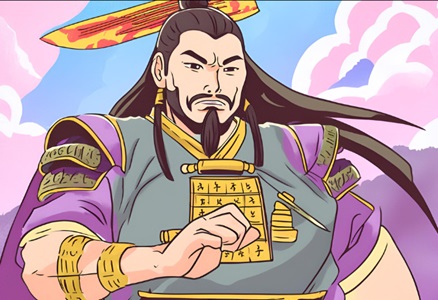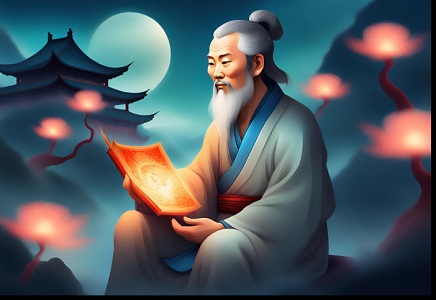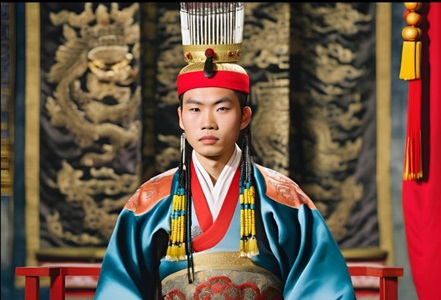Title of Biography in Chinese, Pinyin: 商鞅传 (Shāngyāng Zhuàn).
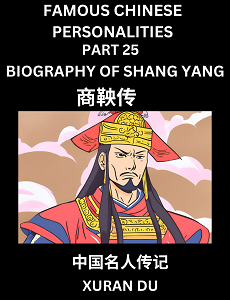
Title of Biography in English: The Biography of Shang Yang.
Check out books on my Amazon and Barnes & Noble homepages as well as the following pages to learn Biographies of famous Chinese personalities-
- Part 1 – Chinese Biography Book Series for Beginners
- Part 2 – Chinese Biography Book Series for Beginners
- Part 3 – Chinese Biography Book Series for Beginners
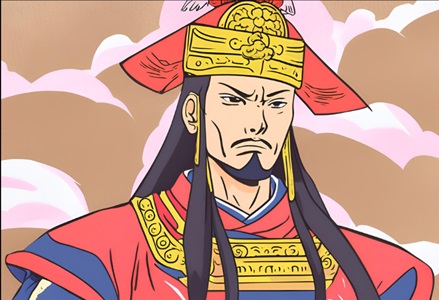
The Biography of Shang Yang in English (英文传记)
Shang Yang: The Reformer of the Warring States Era

Shang Yang, a renowned politician, reformer, and military strategist from the Warring States period, contributed significantly to the prosperity of the Qin state. Originally named Gongsun Yang, he was later known as Shang Yang after being awarded the territory of Shang for his achievements in implementing reforms in Qin.
Born in the state of Wei, Shang Yang studied Legalism in his early years and advocated governance by law, emphasizing agriculture and suppressing commerce. He once served as an official in the state of Wei but was not given much importance. Later, he turned to the Qin state and, with the support of King Xiaogong of Qin, embarked on his path of reforming the country.
Shang Yang abolished the well-field system, promoted the small family system, and implemented the twenty-grade nobility system that rewarded military achievements. These reforms greatly enhanced the national strength of Qin. Additionally, he introduced the joint liability system, strengthening the restraint on civilians while also improving the administrative efficiency of the state. These reform measures laid a solid foundation for Qin’s eventual unification of China.

Although Shang Yang’s reforms achieved remarkable results, they also offended the interests of the old nobility, leading to his eventual execution by being torn apart by chariots. However, his reform ideas had a profound impact on later generations, making him one of the representative figures of the Legalist school of thought in ancient China.
Learn Biography Of Shang Yang in Chinese (中文传记)
商鞅,战国时代著名的政治家、改革家和军事家,为秦国的强盛立下了汗马功劳。他原名公孙鞅,后因在秦国变法有功,被封于商地,故世称商鞅。

商鞅出生于卫国,早年学习法家思想,主张以法治国、重农抑商。他曾在魏国为官,但不得重用,后转而投奔秦国。在秦孝公的支持下,商鞅开始了他的变法改革之路。
他废除了井田制,推行小家庭制度,实行奖励军功的二十等爵制,使秦国国力大增。此外,商鞅还推行连坐法,加强了对百姓的约束,同时也提高了国家的行政效率。这些改革措施为秦国日后的统一六国打下了坚实的基础。
商鞅的改革虽然取得了显著成效,但也触动了旧贵族的利益,导致他最终遭受了车裂之刑。然而,他的改革思想却对后世产生了深远的影响,成为中国古代法家思想的代表人物之一。
Shang Yang Biography Keywords- English, Chinese & Pinyin (关键词)

- 商鞅 (Shāngyāng)Shang Yang: A famous politician, reformer, and military strategist from the Warring States period.
- 法家 (Fǎ jiā)Legalism: A school of thought in ancient China that advocated rule by law and strict discipline.
- 变法 (Biànfǎ)Reform: The process of making changes to a system, institution, or law in order to improve it.
- 井田制 (jǐng tián zhì)Well-field System: An ancient system of land distribution and management in China.
- 二十等爵制 (Èrshí děng jué zhì)Twenty-grade nobility system: A system of nobility ranking based on military achievements.
- 连坐法 (Liánzuò fǎ)Joint Liability System: A legal system in which groups of people are held responsible for each other’s actions.
Pinyin of Shang Yang Biography (商鞅传记的拼音)

Shāngyāng, zhànguó shídài zhùmíng de zhèngzhì jiā, gǎigé jiā hé jūnshì jiā, wéi qín guó de qiángshèng lì xiàle hànmǎgōngláo. Tā yuánmíng gōngsūn yāng, hòu yīn zài qín guó biànfǎ yǒugōng, bèi fēng yú shāng de, gùshì chēng shāngyāng.
Shāngyāng chūshēng yú wèi guó, zǎonián xuéxí fǎ jiā sīxiǎng, zhǔzhāng yǐ fǎzhì guó, zhòng nóng yì shāng. Tā céng zài wèi guó wèi guān, dàn bùdé zhòngyòng, hòu zhuǎn ér tóubèn qín guó. Zài qín xiàogōng de zhīchí xià, shāngyāng kāishǐle tā de biànfǎ gǎigé zhī lù.
Tā fèichúle jǐngtiánzhì, tuīxíng xiǎo jiātíng zhìdù, shíxíng jiǎnglì jūngōng de èrshí děng jué zhì, shǐ qín guó guólì dà zēng. Cǐwài, shāngyāng hái tuīxíng liánzuò fǎ, jiāqiángle duì bǎixìng de yuēshù, tóngshí yě tígāole guójiā de xíngzhèng xiàolǜ. Zhèxiē gǎigé cuòshī wéi qín guó rìhòu de tǒng yīliù guó dǎxiàle jiānshí de jīchǔ.
Shāngyāng de gǎigé suīrán qǔdéle xiǎnzhù chéngxiào, dàn yě chùdòngle jiù guìzú de lìyì, dǎozhì tā zuìzhōng zāoshòule chēliè zhī xíng. Rán’ér, tā de gǎigé sīxiǎng què duì hòushì chǎnshēngle shēnyuǎn de yǐngxiǎng, chéngwéi zhōngguó gǔdài fǎ jiā sīxiǎng de dàibiǎo rénwù zhī yī.
